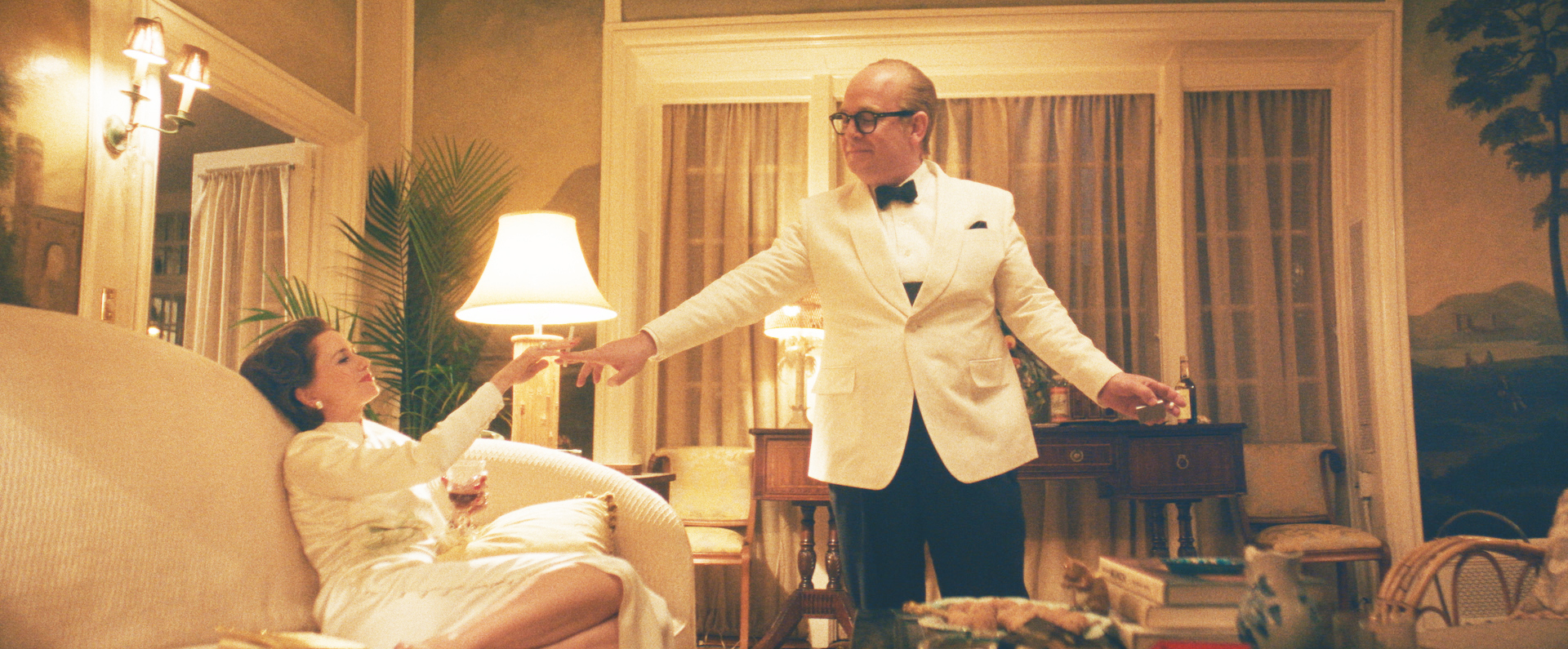What is it that makes relationships between queer men and glamorous women so intimate—and so volatile? Consider Jennifer Coolidge’s tragic White Lotus character, Tanya, who wandered off with a crew of fortune hunters that she breathlessly described as “high-end gays.” Or Andy Cohen playing ringmaster to a universe of pugnacious Real Housewives.
[time-brightcove not-tgx=”true”]
Half a century ago, the Andy Cohen of the Upper East Side was Truman Capote, and the women whose world he insinuated himself into were A-list socialites. For two decades, the author of In Cold Blood and Breakfast at Tiffany’s heard their confessions and dried their tears. Then, in 1975, he published a story in Esquire that exposed their deepest humiliations. FX’s Feud: Capote vs. the Swans, the long-awaited second season of a Ryan Murphy anthology that began with 2017’s Bette and Joan, traces the friendships and eventual schism. It’s a messy rendering that, at times, reverts to cliché. But beneath the distracting artifice is a psychologically rich, wonderfully acted portrait of an artist torn between his work and the life that fueled it.
Tom Hollander (the lead villain in Lotus) is well cast as the diminutive Truman, in a story that spans from the mid-’50s through his premature death in 1984, hopping between eras with confusing frequency. At ladies-who-lunch mecca La Cote Basque, he charms the adventurous C.Z. Guest (Chloë Sevigny), banters with brassy Slim Keith (Diane Lane, excellent), and taunts wild-eyed Ann Woodward (Demi Moore), whom he insists killed her husband. A standout episode, framed as footage for a Maysles brothers documentary, revisits Truman’s ultra-exclusive 1966 Black and White Ball, which marked the height of his influence.
At the heart of the series is the author’s relationship with Babe Paley (an enchantingly brittle Naomi Watts), which writer and executive producer Jon Robin Baitz, adapting Laurence Leamer’s gossipy book Capote’s Women, interprets as a tragic romance. Platonic sparks fly when they meet on a private jet in 1955. Truman worships Babe’s beauty and poise; she feels safe, loved, yet vividly alive when they’re together. Years later, he coaches her to use her powerful husband Bill’s (the late Treat Williams) serial infidelity to her advantage. “Figure out what it is you want,” he drawls after one egregious incident. Then he gives her a Valium to swallow with her Scotch and lets her snuggle up beside him. “The only person who could ever hurt me is you,” Babe tells Truman.
And he does. The infamous Esquire story earns him the wrath of the image-obsessed women he calls his swans. Led by Slim, they drop him overnight. Babe, whose marital woes Truman aired in lurid, barely veiled detail, follows the crowd but misses him terribly. After the breakup, each becomes the other’s one who got away.
Truman’s betrayal, and the show’s fascination with that choice, situates Capote vs. the Swans within a canon of Murphy series about real queer men who range from difficult to diabolical. In Dahmer—Monster and The Assassination of Gianni Versace: American Crime Story, the serial killers (and many of their victims) are men who sleep with men. Halston’s fashion designer antihero forsakes art and love for money and fame, terrorizing the people who care about him the most.
Capote could easily have come off as similarly monstrous. Like Halston, his origin story involves a pitiful mother; Jessica Lange is pure camp as Truman’s withholding mom, a social climber who failed to penetrate the very same Manhattan circles that would welcome her son. The scenes where she appears, often in spectral form, are Murphyverse boilerplate.
But, to his credit, Baitz also attributes to his protagonist motives more complicated than revenge on the kind of women who rejected his striving mom. Along with being a social gadfly, Truman was an ambitious writer. He pitched Answered Prayers, the unfinished novel that the Esquire story excerpted, as a gimlet-eyed peek into the secret world of high society. Yet as he grew closer to his subjects, he struggled to write it, missing deadline after deadline. His descent into alcoholism, captured by Hollander and director Gus Van Sant with a starkness that recalls Van Sant’s Kurt Cobain film Last Days, plays a crucial role. So do his romantic woes; Truman alienates a loving partner (Joe Mantello) by doting on an abusive lover (Russell Tovey).
He may have been the swans’ confidant, but they were not his. As one James Baldwin (Chris Chalk, doing his best with an impossible role) notes, in an insightful, if heavy-handed, episode in which the iconic writer gives Truman a pep talk, gays did not at the time have the same supportive community to fall back on as other minorities. Whispered slurs confirm that the swans never fully accepted him; after Esquire, Babe calls him a “homosexual court jester singing for his supper.”
Capote took the title of Answered Prayers from a line attributed to Saint Teresa of Avila: “There are more tears shed over answered prayers than over unanswered prayers.” He was, presumably, referring to the dreams of wealth and privilege that the swans used their beauty and wiles to achieve. But Feud suggests that Babe and the rest had always been just as treacherous to their gay best friend as he was, that one time, to them. The outcome of Capote’s own answered prayers? A ruined career. A life cut short. And a bottomless reservoir of tears.

